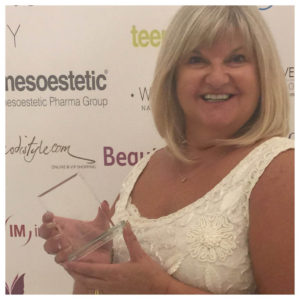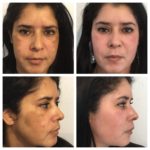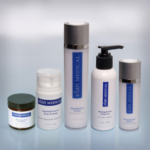Hyperpigmentation in Skins of Colour
Ask most ethnic women what their biggest skincare concern is and they’re likely to say hyperpigmentation. Caused by the overproduction of melanin, hyperpigmentation may be difficult to correct, but it’s very easy to avoid. All skin, no matter the ethnicity, will produce varying amounts of pigment.

Skins of colour are more prone to hyperpigmentation
‘The darker you are the more solid and dense the area of pigmentation will be, whereas the pigmentation in Caucasian skin is more freckled,’ explains ours skin specialist, Sue Ibrahim.
The amount of pigment we produce also correlates with the amount of protection we require from the environment.
So a person living in hotter climes like Africa will naturally produce more pigment to protect the skin against harmful UV rays.
‘Hyperpigmentation occurs when there is too much pigmentation in the skin,’ says Sue Ibrahim.
‘This is usually found all over the face.
‘Melasma is another form of pigmentation which occurs, usually during hormonal changes, such as pregnancy and can be found in specific areas like the upper lip and cheeks.
The other type of pigmentation women suffer from is post-inflammatory hyperpigmentation (PIH), which is caused by scars left from spots and acne. Although overexposure to the sun’s harmful UV rays plays a part in causing hyperpigmentation, there are other factors to consider. ‘Hyperpigmentation occurs when there’s an irregular production of melanin,’ explains Sue Ibrahim ‘But it’s not just caused by the sun – lifestyle, trauma to the skin and hormonal changes all play a part too.’
Do you have hyperpigmentation?
Although there is little evidence to suggest hyperpigmentation relates specifically to ethnicity, it’s generally accepted to be more prominent in ethnic skin due to the darker skin colour.
‘Dark skin has more melanin, and when an injury is caused to the skin, the cells which produce melanin go into overdrive and distribute it unevenly causing darker patches,’ explains Sue. The hyperpigmented parts of the skin will be a lot darker than the rest of the skin, which makes it difficult to cover up. Caucasian skin is also prone to suffer hyperpigmentation, although it isn’t as obvious. ‘Hyperpigmentation is triggered by the sun in paler, Caucasian skin tones and this can lead to freckles, sun spots and discolouration as the skin ages.’ Paler skin suffers from hypopigmentation, which occurs when there isn’t enough pigment in the skin. ‘This is usually the result of a skin disorder such as vitiligo”. Due to the lack of melanin, individuals will be at far higher risk of burning, so should opt for a good SPF and look at treatments which help even skin tone, making the blemishes less obvious.
Treatment for hyperpigmentation
Treating hyperpigmentation is difficult and can take weeks of using prescription-only creams before you start seeing visible results. ‘Hyperpigmentation is commonly the result of either hormonal changes or sun damage so prevention is desirable whenever possible.’ In the event it does occur, you’ll need to combine appropriate treatments with a change in behaviour – fully altering sun habits is crucial to prevent hyperpigmentation from getting worse’.
Why choose Elan Medical Skin Clinic?
Unlike many other beauty and aesthetics clinics, the treatments and solutions at Elan Medical Skin Clinic are based on proven medical techniques. At the helm is Sue Ibrahim, a highly regarded nurse consultant in dermatology, who uses the knowledge she has built up from more than 30 years of working in this field.
How do I book an appointment?
You can either call Elan Medical Skin Clinic on 01268 770660 between 9.30am and 5pm Monday to Saturday or you can complete an online booking request form and one of our reception team will contact you by phone or email, whichever you prefer. You will be asked to pay your initial consultation fee by credit or debit card on confirming your appointment.





